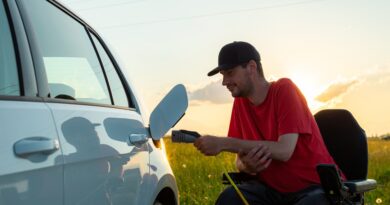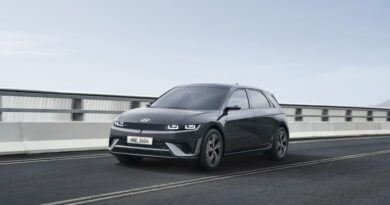Grundon unveils electric waste collection vehicles
Waste and recycling specialist Grundon Waste Management has just unveiled the first two electric vehicles to join its fleet.
It is part of an annual £5 million investment programme in a greener, cleaner fleet; part of the company’s commitment to achieving net zero.
Chairman, Neil Grundon, said: “We see this innovation as a real game-changer and an important milestone on our ongoing journey towards further helping businesses achieve their sustainability targets.
“We are collecting their waste in electric vehicles, turning it into electricity via our Energy from Waste facility and using it to power our vehicles ready for their next collections. It is a perfect example of the circular economy in action and we believe it is the first time any waste company has delivered such an innovative and forward-thinking programme.
“This is better for our customers, for our drivers and for the planet. We see that as a very powerful message and a tangible demonstration of what can be achieved as we continue to invest further in electrifying our fleet.”
The first of the all-electric e-One refuse collection vehicles is now operating from Grundon’s Colnbrook near Slough base in Berkshire, serving commercial customers across London and the wider Thames Valley. The waste it collects every day goes directly to Grundon’s Lakeside Energy from Waste (EfW) facility, creating more than enough electricity to charge the vehicle ready for the next day’s collections.
A second electric waste collection vehicle at Grundon’s Bristol depot is now serving customers across the city, and a third is shortly due to start collections in Reading and Newbury from Grundon’s base at Beenham, also in Berkshire.
Two more electric vehicles will be based at Colnbrook and Bristol in the coming months, with further electric and alternative fuel vehicles joining the fleet as Grundon prioritises its carbon reduction agenda.
Grundon’s investment combines both the conversion of its existing diesel Dennis Eagle Mercedes-Benz Econic waste collection vehicles to electric and the purchase of new Scania electric waste collection vehicles.
The electric vehicles deliver a range of benefits, including helping to reduce air and noise pollution, as well as delivering a cleaner environment, and are ideally suited for managing collections in areas where Ultra Low Emission Zones (ULEZ), Clean Air Zones (CAZ) and Zero Emission Zones (ZEZ) have been introduced.
For every tonne of non-recyclable waste deposited, the EfW generates around 620kW of power. Given that each all-electric vehicle collects an average of five tonnes of waste per round, it means the EfW is capable of generating 3,100kW of energy per day, per vehicle.
With 280kW set aside to recharge each vehicle, this still leaves a further 2,820kW of electricity for export to the National Grid on a daily basis – enough to power an average-sized house for a year.
This means, for every day one electric vehicle is on the road, it is powering one house for one year.
The ongoing vehicle conversion programme has seen Grundon partner with Refuse Vehicle Solutions (RVS), a leader in the remanufacture of waste vehicles, and Dutch vehicle conversion technology specialist EMOSS.
RVS Chief Executive Officer, Spencer Law, says the move to electric makes both financial and environmental sense.
He explains: “Modifying a diesel refuse vehicle not only saves in excess of £100,000 versus the purchase of a new electric vehicle, but it also gives it a new lease of life – literally recycling on the go.
“We already had a long-standing relationship with Grundon and, when they started looking at the electrification route, we were proud to be chosen as their preferred supplier. As two family-owned businesses working together, we have absolute confidence and trust in each other’s abilities.”
Spencer added: “At RVS, we have always prided ourselves on being ahead of the curve and some years ago I could see that the electrification of refuse vehicles was becoming more and more of a hot topic.
“Having searched around the globe for a partner that could deliver the conversion technology, it became clear that EMOSS is a world-leader in the field of vehicle electrification conversion kits. Together, our joint initiative is delivering real change on the UK’s roads and we look forward to expanding the electrification programme still further.”
Following a series of trials, teams from Grundon and RVS visited the EMOSS factory as Vernon Edwards, EMOSS’s UK Business Development Manager, says it was important for Grundon to see the technology for itself.
“Grundon spent time with our technical team looking at the performance of different vehicles and we were able to reassure them that with a 19-year pedigree and over 600 vehicles using our conversion kits around the world, we have an excellent track record,” said Vernon.
“We are very pleased to be working in partnership with Grundon and RVS and have a very strong bond with them. It is thanks to RVS’s capabilities – in particular those of Josh Law – and their experience of refurbishing refuse collection vehicles, that we were able to deliver the solutions Grundon was expecting.”
A key part of that expertise was around ensuring that, as well as powering the vehicles on the road, the battery technology is sufficient to drive all the necessary hydraulic and compulsion systems to manage collections, bin lifts and compaction processes.
Vernon adds: “The hydraulics system is quite demanding in terms of power and Josh knew exactly what needed to be done to provide the expected operating performance. It is effectively one big mathematical calculation and the 280kW battery packs we have fitted to the vehicles are giving Grundon what they need to power each vehicle’s operations and meet customer demands.”
Grundon Director Bradley Smith, added: “The success of our trials gave us 100% confidence that the new electric vehicles have the capacity to complete average waste collections of around 80-100km per day, without the need to recharge en-route.
“Our plan is to purchase further electric vehicles, as well as investing heavily in alternative fuels and looking at further hybrid options.
“Potentially, this may include hybrid electric/hydrogen vehicles and we are very excited by the new technology that is coming along. In particular, battery performance is increasing all the time and the further batteries are capable of travelling, the more opportunity there is to invest in this technology.”
As part of its ongoing environmental pledge, Grundon is focusing on building a fleet of mixed alternative fuel vehicles. It already has one ultra-low emission hydrogen diesel dual-fuel waste collection vehicle in operation.
In 2014, Grundon became the first of the major waste industry players to adopt CarbonNeutral® certification across its vehicle fleet, offsetting its carbon emissions by supporting a wide range of rural community projects across East Africa and beyond.
Since 2000, Grundon has reduced its carbon emissions by nearly 80% through a series of measures, including an ongoing energy self-sufficiency programme and investment in state-of-the-art technology.






